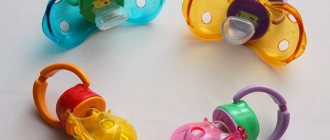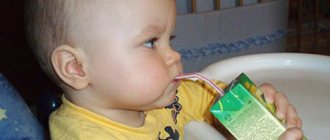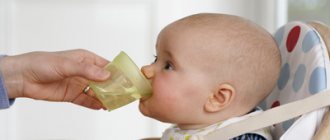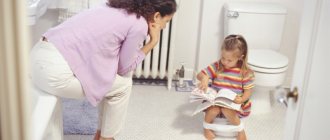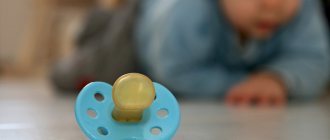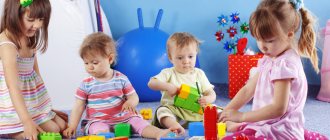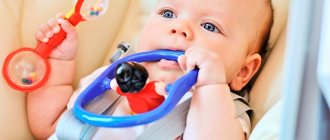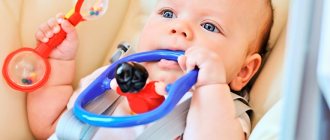Home › Child under one year old › Parenting
Author of the article
Tatyana Stanislavovna Kurtsaeva
Reading time: 3 minutes
AA
Article last updated: 08/18/2019
A baby born into a family brings joy and additional worries to young parents. Mom has a lot of questions at the initial stage. One of them is how to teach a child to drink water, at what age, and how much to give it.
Why is it important for your baby to drink?
Water, like a life-giving elixir, is necessary for adults and children. Fluid is excreted through sweat and urine, so its reserves must be constantly replenished. For a breastfed baby, drinking water is not important. After all, mother’s milk contains more than 80%. In this case, additional drinks should appear in the diet along with the introduction of complementary foods or at the request of the newborn . But artificial babies and children on a mixed diet need additional inclusion of water in their diet. The baby's digestive system is not ready for food that is too thick. Fluid deficiency causes constipation and disruptions in the gastrointestinal tract.
Why do you need to give your baby enough to drink?
- Drinking the drink prevents the body from overheating and saves from dehydration.
- Maintaining water balance helps accelerate the baby's growth, normalizes the process of cell division, stimulates brain function, and improves attention.
- Water launches the functionality of metabolism and promotes the elimination of toxins.
- Liquid in the proper amount has a beneficial effect on the functioning of the gastrointestinal tract, eliminating problems with stool and digestion of food, especially solid food.
- The drink invigorates the child.
The opinion that ordinary drinking water provokes the development of dysbiosis is nothing more than a myth. Naturally, if we are not talking about “raw”, i.e. unboiled liquid.
Read more about the benefits of water for your baby
Everyone needs water, but small children need it especially. And at this point it is necessary to dwell in more detail.
- Water cleanses the child's body of toxins, and with its help, the child's metabolism improves.
- Water helps to better absorb and digest food. As a result, the baby's stool becomes softer, and he does not suffer from constipation.
- Water promotes the functioning of the baby's brain, and, in addition, helps the child grow.
- A child who drinks enough water is usually more cheerful and cheerful than other children, he is better at attentiveness, he remembers information easier and more, and it is easier to teach him any action.
- Water helps the baby fight viruses and, accordingly, tolerate viral diseases more easily.
- A baby who drinks water develops his skeleton and all other bones faster and more correctly.
- In addition, water prevents obesity, and the child grows slim and beautiful.
When a child does not have enough water: main signs
So, from the age of six months onwards, the child must be given water to drink. Of course, you need to do this skillfully, that is, understand exactly when the baby needs to be given something to drink. There is a whole list of signs and symptoms here that parents should be aware of. So, the child clearly does not have enough water in the body if:
- there is a tendency to frequent allergies;
- Gum diseases and caries are detected, teeth begin to deteriorate and decay;
- there is an unpleasant odor from the mouth;
- the abdomen or stomach begins to ache, constipation occurs;
- the skin and mucous membranes become too dry;
- dandruff appears, hair begins to fall out;
- the baby often suffers from infectious and viral diseases;
- he gets tired quickly;
- he is constantly lethargic, apathetic, and is often in a bad mood;
- the child rarely goes to the toilet “in small quantities”, and at the same time his urine is too concentrated and has a strong specific odor.
These are the main signs that parents should definitely pay attention to. And - start giving the baby some water. Moreover, we are talking specifically about clean, ordinary water, and not about its substitutes such as juices or sodas. In this case, the child will not benefit from them (especially from soda). Only water!
How much water should a child drink
Of course, there are no specific rules in this regard, since everything depends on the child himself. Some people need a little more water, others less. However, approximate standards exist, and they are as follows:
- Children under 3 years old should drink about one liter of water per day;
- from 3 to 7 years the norm increases - one and a half liters of water per day;
- after 7-8 years, a child should drink 1.8-2 liters of water per day.
What is the best and easiest way to teach a child to drink water?
There are also many ways, tricks and parenting tricks here. Moreover, each mother or father has their own. Therefore, we will mostly talk about the general rules that, one way or another, are applied by almost every parent who accustoms their baby to water. So, about the rules.
- The bottle with water and the nipple on it must be set aside. Why should a baby be taught to use a pacifier once again? After all, then he will have to be weaned off it, and it is possible that at the same time the child will be weaned off water. Therefore, it is better to give your baby water from a spoon, cup or a special children's sippy cup from the very beginning.
- You should not give your baby a lot of water right away. A few teaspoons are enough to get started. Then, when he gradually gets used to the water, the rate should be gradually increased.
- How can you tell if your child is drunk or if he still wants some water? Here the mother herself must determine this moment based on the behavior of her child. It’s not that difficult: knowing her baby, a mother can easily figure out all his “wants and don’ts.”
- It is necessary to carefully monitor the water your child drinks. Firstly, it must be exceptionally clean. Therefore, it is better not to experiment, but to buy special baby water. It is sold at any pharmacy. And secondly, you need to pay attention to the temperature of the water. It should be neither too cold nor too hot. The most suitable water temperature for a baby is room temperature.
- Sometimes, to encourage the child to drink water, the mother adds sugar to it. Whether this should be done is a debatable question. But if you add sugar, then each time there should be less and less of it. In the end, the baby won’t even notice how he gets used to ordinary clean water without any additives.
- But in general, most pediatricians believe that it is better to add not harmful sugar to the water, but a few drops of sweet fruit juice. Or do the opposite, diluting the juice with water. Moreover, gradually there should be more and more water, and less juice.
- For a baby, the drinking process itself is often interesting. Often he doesn’t want to drink from ordinary dishes, but he will drink with pleasure from a beautiful cup painted with cartoon characters. Well, there is nothing easier than buying a child such a cup and drinking from it. Or let the baby, if he is already big enough, choose such a cup for himself.
- If the child does not want to drink from a cup or cannot hold it in his hands, then let him drink from a straw or a children's sippy cup.
- You can teach your baby to drink water through a game or a fun competition. What this game will be like and what the meaning of the competition is, the mother decides.
- The example of parents is very important for a child. And when teaching your baby to drink water, it would be a sin not to take advantage of this. Everything is simple here. Mom and dad need to drink water as often as possible in front of the baby and demonstrate in every possible way how tasty the water is. The child will definitely want to follow the example of his parents, and thus will gradually become more inclined to drink water.
- When going with your child for a walk, to the hospital or to some other places, you do not need to take juices or fruit drinks with you, but only clean water. And when the baby is thirsty, offer him water. There is nothing else anyway, and therefore the baby, willy-nilly, will start drinking it.
- Another effective method is to leave water in a visible place and so that the child can easily get it if desired. On the contrary, put all kinds of juices, sodas and fruit drinks away. When the baby gets thirsty, he will inevitably reach for water, because there is nothing else anyway!
- It often happens that a child does not drink water only because he forgets to do so. Well, if he is big enough, then you need to periodically remind him of this. And when a very young child is still very young, you need to remember to give him something to drink. Especially when it's hot.
All these tips, apparently, are simple, understandable and logically sound. And the job of parents is to always remember them. Then the child will quickly get accustomed to water and begin to drink it with pleasure himself.
When to give water to a baby
Pediatricians, together with WHO, recommend introducing additional fluid to the baby from the second month of life.
Babies born in the summer are allowed to be given water from birth. After all, it is not always possible to quench your thirst with breast milk alone. You need to look at the baby’s reaction and offer liquid in cases of restless behavior and turning away from the breast.
Pediatricians advise feeding infants:
- in extreme heat to prevent dehydration and overheating;
- for colic;
- with frequent constipation, diarrhea or repeated vomiting;
- with congenital jaundice.
In case of diseases accompanied by high body temperature, pediatricians recommend putting the newborn to the breast more often. And don’t forget about supplementation.
If the baby does not want to drink, then teaching him to drink water should be postponed, and only occasionally offer it unobtrusively. Excessive persistence will lead to unwanted tantrums. And in the future, when trying to accustom a child to water, additional problems will appear.
Why do babies need water?
There are a number of reasons why a person cannot live without water:
- water is involved in the digestion process and is a component of gastric juice;
- thins the blood;
- removes toxins, preventing the development of infection;
- maintains tissue elasticity, cartilage and joint strength;
- slows down the withering process;
- Helps control the amount of fatty tissue.
Scientists are divided into two camps. Some are ardent opponents of feeding a child before complementary feeding is introduced. In their opinion, breast milk contains enough liquid. The exception is for bottle-fed babies - they are recommended to be given water from birth. Another group of experts is convinced that water should be given to children as early as possible. When your baby has a fever, give him something to drink more often to avoid dehydration. It is unwise to urgently accustom a sick child to water - it is easier to introduce the baby to water in advance.
How much fluid does your baby need?
Intake rates for infants depend on several factors - age, weight and nutrition. Breastfed babies do not need supplemental feeding until 5-6 months. For bottle-fed babies, additional fluid is recommended in the amount of 20 ml 4-5 times a day between feedings.
From the moment complementary foods are introduced until the transition to a common diet, the required amount of water is calculated according to the following principle: 50 ml of liquid * child’s weight. For example, a one-year-old baby weighing 10 kg needs 500 ml of liquid per day. This value varies depending on the baby’s diet. If the bulk of the diet is still formula or breast milk, then 200-250 ml of additional fluids will be enough. With a complete transition to a full-fledged “adult” diet, it is not recommended to reduce the daily water intake.
At the age of 2–3 years, the amount of fluid required varies from 500 ml to 1.3 liters, from 3 to 7 – approximately 1.5 liters per day.
For children over 7 years old, the daily portion of water increases and is practically compared with the standards for an adult. The minimum volume of clean water drunk per day should not be lower than 1.5 liters. At the same time, the amount of fluid increases during periods of illness, high physical activity and hot weather.
Is all water suitable for a child? What kind of water should I give?
What kind of water can be given to a newborn? You can use tap water, but it must first be boiled and cooled so that it is not too hot.
You can use a filter element for cleaning with water or take baby water. As a rule, doctors recommend giving infants store-bought water - this is a bottled liquid with the lowest possible concentration of mineral salts.
When you take baby water, it’s better to ask what category this liquid is from, there are two of them:
- Drinking water for babies who are over 6 months old and have already started feeding them;
- Water for recovery, from this water you can prepare food for the child.
In order for your baby to drink water with great pleasure, it can be made a little sweeter using fructose, but you can add no more than 0.5 teaspoon per hundred ml of liquid.
By the way, children's nutritionists strongly do not recommend accustoming a baby to the sweet taste, because sugar is not the most necessary product, or rather, a product that is not necessary for a baby at all, and sweets will cause problems with teeth in the future, and not only with them.
How to teach a child to drink water: 7 basic rules
To prevent your baby from refusing to drink, you need to follow the advice of pediatricians. Then the problem of how to accustom a child to water will not arise.
- The temperature of the proposed liquid should be about 25 degrees.
- When breastfeeding, you should not give water from a bottle. There is a risk of breast refusal. The best option for babies is a sippy cup, a teaspoon or a syringe. For older children - a mug, a children's glass with a straw.
- Do not sweeten water with sugar or honey. A child will be more willing to drink a sweet liquid, but such a drink has a negative effect on children’s kidneys. You should also give up juice, tea and other “flavored” drinks, even in diluted form.
- You need to supplement between feedings, starting with small doses - 1-2 teaspoons at a time.
- It is recommended to teach children over one year old to drink regular water in a playful way. These could be games of “tea drinking”, where the child himself will give water to the toy guests.
- Water must always be available. Dishes with it need to be placed in the kitchen, in the children's room, so that the child can reach and drink on his own.
- A personal example will help in solving the problem. When the baby sees that mom and dad drink regular water, and not sweet lemonades or kvass, he will also have a desire to try it.
Tips for water training
Experts give the following recommendations for feeding children under one year of age.
- You need to start feeding your baby with small doses of a few drops. For convenience, you can use a pipette or syringe without a needle.
- Don't force your child to drink against his will.
- Avoid adding sugar or food coloring as this puts extra stress on your kidneys.
- Pay attention to your baby's mood. If he is not in a good mood and refuses water, try again the next day.
- Buy a colorful sippy cup. First, make it a toy, then pour some water into it. Offer the sippy cup regularly, one day the baby will become interested in it.
Act out an exciting scene. For example, let the sippy cup become your flying ship, imitate the sounds of flight. The main thing is that the baby is comfortable and happy. Then he will begin to look forward to the next time you take out this toy.
For an older child, such tricks will not be enough. To teach a child to drink plain water, experienced teachers suggest adding the following techniques to your arsenal.
- Provide your little bully with constant access to water. He should always be able to take a bottle and drink. Often children do not realize that they are thirsty, but a familiar object will create the necessary association.
- Enter the 5 sips rule. If the little one is convinced that he doesn’t want to drink, offer him only 5 sips. As a rule, children drink more.
- For a baby older than one year, it is permissible to add a couple of tablespoons of freshly squeezed juice to the water. The child will be attracted by the color and smell.
- Instead of a sippy cup, buy a themed cup. For example, if a boy loves cartoons about superheroes, give him a cup with their images. Tell me, if you drink ordinary water from it, you will become smart, like fixies, etc.
Why do children sometimes not drink?
The reasons for refusal vary. The main one is the lack of parental example. If no adult in the house drinks water, but replaces it with soda, juice or tea, then you should not expect your child to happily empty a mug of unsweetened drink.
There is another common mistake that parents make. This is the lack of free access to drinking water. The kid wants to quench his thirst, but he doesn’t find a mug with a drink, and then gets distracted by the game and forgets about what he wanted to drink.
If the baby is offered only juices, compotes, and children's teas, then he will definitely refuse ordinary water. After all, it is colorless, tasteless and odorless.
Difference between water and other drinks
Young parents should know that our body perceives juice, compote, tea and other drinks as food. Filtered boiled water is a thirst quencher for humans. If you constantly drink drinks other than water between meals, your stomach will work without rest. Its constant work leads to disturbances in the digestive system. That’s why it’s so important to give your baby water on demand and take a bottle with you on walks.
If your little one doesn't want to drink water because he prefers something sweeter, try making his favorite drink less concentrated. Dilute it with water: first by one-fifth, then by a quarter, then by a third. Gradually you will teach your baby to drink water.
Drinking plain water is a healthy habit for life. There are no calories, nutrients or vitamins in the water. But it maintains fluid balance in the body. Remember this and do not put off teaching your child to drink water for too long.
Water consumption standards for children at different ages
- From 0 to 1 year. At this time, children receive maximum nutrients and water, including from breast milk, so there is no need to supplement infants with water. When the baby is bottle-fed, water should be given from the first day of life at the rate of 150-200 ml per day.
- From 1 year to 3 years. During this period, the child’s activity increases, he already eats food from the common table. Up to three years of age, children should drink water based on 50 ml of clean drinking water per 1 kg of weight, excluding juice, compote and other drinks.
- From 3 to 7 years. In preschool age, a child needs from 1.2 to 1.7 liters of water per day. It is better to teach your child to drink little by little, but regularly.
- From 7 years old. At school age, a child’s drinking regime can be the same as that of adults. A particularly active child should drink 1.5 to 2 liters per day.
At what age to start?
Babies who drink breast milk do not need additional water, since milk consists of 75% water.
At this stage, it is enough for the child’s body. The amount that the mother drinks is of great importance. If it is sufficient, the consistency of the milk will be normal.
It is necessary to supplement the baby's food only with artificial feeding . Formulas for babies may contain ingredients that increase thirst or cause constipation.
In this case, usually the water that is spent on preparing the gruel is not enough to meet the needs of the body. In such cases, you cannot do without additional soldering.
It is necessary to accustom a breastfed baby to water during the period of complementary feeding (at the age of 4-5 months), when new food different from milk appears.
